south sudan
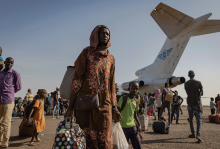
I AM SOUTH SUDANESE. I went to Khartoum [Sudan] in 2019 to study at the Comboni College of Science and Technology. I was working at a hospital at night, and in the morning I went to school. That’s what I was doing when the war broke out in April 2023. There in Khartoum, Christians and Muslims were living normally. I was studying with them. I used to play soccer, basketball, and chill with them anytime. On Saturday morning, I was at home and we heard some big ammunitions. We saw a jet flying in the sky, shooting. It was terrible. For two days, from morning until 6 p.m., the guns never stopped. Everyone was shocked.
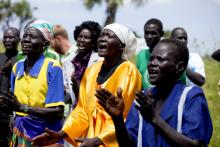
SOUTH SUDAN is the world’s youngest and most fragile state. The outbreak of civil war in 2013 pushed millions out of the country and into refugee camps. Oil revenues fuel President Salva Kiir’s regime, notorious for kidnapping and torturing those who criticize him.
Kiir’s suppression hasn’t stopped courageous Christian women from taking their prayers for peace to the streets. On the first Saturday of every month, hundreds of women gather to demand an end to war.
“All 64 tribes are represented in the women’s division of the South Sudan Council of Churches,” said Maria Bol (not her real name), a member of the ecumenical body responsible for organizing the marches. “The challenge in South Sudan is that the government has no tear gas. They just use live bullets against peaceful protesters. But our actions often go on uninterrupted, since they know we are peaceful and prayerful.”
Although the international media portrays South Sudan’s women and youth as passive victims of their tragic circumstances, it is exactly these demographics that are pushing back against this brutal regime. In November, youth members of more than 40 women’s organizations convened the largest anti-war demonstration since the war began. Thousands turned up, wielding messages of peace while Kiir’s national security forces—responsible for intimidating and abusing his critics—attempted to single out leaders.
These leaders continue to suffer—some even being intimidated in the neighboring countries to which they fled—and threats continue against their family members back home.
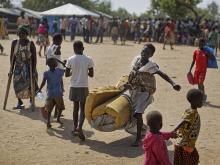
“This is a fast-growing humanitarian situation which we have never seen before,” said Benson Okabo, World Vision’s West Nile Refugee Response operations manager. “We are concerned that the donor assistance has been little.”
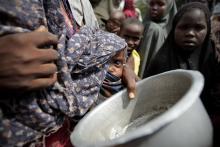
Buried beneath daily headlines dominated over the past year by the Russia investigation, Brexit, and the impasse over health care lies an escalating humanitarian crisis that should be breaking our hearts and assaulting our consciences: More than 20 million people’s lives hang in the balance due to a mounting famine in Yemen, South Sudan, northern Nigeria, and Somalia.

The Vatican said on Tuesday it had scrapped tentative plans for Pope Francis to make a visit this year to South Sudan, which has been hit by civil war, famine, and a refugee crisis. Vatican spokesman Greg Burke said the trip "was not for this year" but did not say when it might now take place.
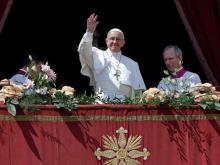
Pope Francis used his traditional Easter Sunday message to call the bombing of a refugee convoy near Aleppo, Syria, a “despicable attack”, and urged world leaders to “prevent the spread of conflicts” despite mounting tensions in Syria and North Korea.
In his Easter blessing, known as “Urbi et Orbi” (“to the city and the world”), the pope urged the faithful to remember “all those forced to leave their homelands as a result of armed conflicts, terrorist attacks, famine, and oppressive regimes.”
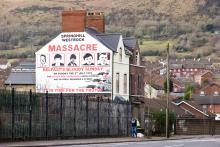
When our desire for security is so great that it diminishes our humanity and our capacity, or willingness, to see the world through the eyes of another, we lose a precious part of who we were designed to be. Our hearts are hardened, calcified.
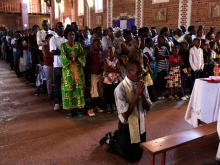
Roman Catholic bishops in Rwanda have issued an apology for the role played by individual clergy and church members, in the 1994 genocide in which nearly 1 million ethnic Tutsis and Hutus were killed.
On Nov. 20, the apology was read aloud in all Catholic churches, in the local Kinyarwanda dialect. It came at the end of Pope Francis’ Jubilee Year of Mercy.
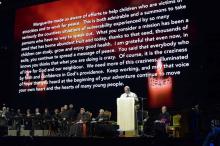
Even by this pope’s standards it was a bold move.
Francis, the spiritual leader of more than a billion Roman Catholics across the globe, this week traveled to Sweden, one of the most secularized countries in Europe, to take part in events marking 500 years since Martin Luther kickstarted the Protestant Reformation.
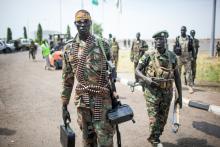
A harrowing UN report, released March 11, reveals horrific government-operated attacks against civilians in South Sudan, the youngest country in the world. The report stated that suspected opposition groups, including children and the disabled, are "being burned alive, suffocated in containers, shot, hanged from trees, or cut to pieces" by government or government allied forces.

Sudanese Christians and human rights groups are urging the government to produce two clerics, whose location has been unknown since their arrest in December. Hassan Kodi, 49, secretary general of the Sudanese Church of Christ, and another pastor, Telal Ngosi, 44, were detained after attending a Christian conference in Addis Ababa, Ethiopia, in October. The two represented the Sudanese Church of Christ at a meeting to discuss the plight of Christians in Sudan and South Sudan.
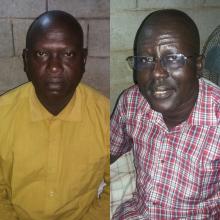
After international outcry, two South Sudanese Presbyterian Evangelical Church pastors who faced a possible death sentence in Sudan have been set free after a court hearing Aug. 5.
The Rev. Michael Yat and the Rev. Peter Reith were on trial in Khartoum on criminal charges of undermining the constitutional system, espionage, promoting hatred among sects, breach of public peace, and offenses relating to insulting religious beliefs. The first two charges are punishable by the death penalty or life imprisonment.
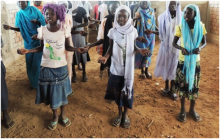
There are a lot of reasons to be concerned about the situation in South Sudan. But as I saw on my trip, there are also reasons to be hopeful. Working for a faith-based organization provides many opportunities for me to not only reflect on my faith but also put it in to action in my day-to-day work. While I grew up outside of a specific congregation, my parents instilled in me from an early age the importance of helping those in need, no matter their race, religion, or any other difference because we are all equal in the eyes of God. It’s this idea, paired with my love of learning about cultures, which put me on this path of working for an organization like Lutheran World Relief. I feel blessed because I wake up every day excited to go to work. While there are many daunting challenges in the relief field, I chose to see the good when possible because if you look closely, hope is there in even in the darkest of places.
Here are a few inspiring highlights from what I witnessed in South Sudan.
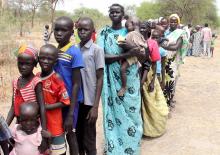
Amid killings, rapes and abductions, the international evangelical humanitarian agency World Vision indefinitely suspended its operations in South Sudan’s Unity State over the escalating conflict.
Multiple other aid agencies, including Doctors Without Borders, have taken similar action.
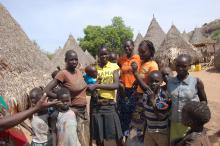
As world attention shifts to the growing influence of Muslim militant groups on the African continent, few have paid any attention to the ongoing bloody conflict in South Sudan.
An estimated 50,000 people have died and 2 million have been displaced in the latest phase of fighting in this nation, according to the International Crisis Group, a think tank that aims to prevent and resolve such conflicts. That’s about five times more than in northern Nigeria, where the Islamist militant group Boko Haram has killed more than 5,000 people in six years.
“South Sudan’s conflict is not getting much attention due to shifting interests towards Islamic extremism,” said the Rev. Fred Nyabera of Kenya, a social scientist who is director of the Interfaith Initiative to End Child Poverty at the global faith-based organization Arigatou International. “This has become a global issue because of the immediate threats it poses to nations.
“But leaving South Sudan alone at this time when the people are trying to define their identity and country, under very fragile circumstances, is to postpone a big problem,” Nyabera added.
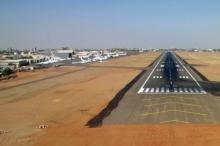
A Sudanese Christian doctor freed from death row on charges of apostasy Monday is not yet free after authorities detained her at a Khartoum airport.
She was apprehended along with her husband, Daniel Bicensio Wani, an American citizen of South Sudanese origin, and their two children — 20-month-old son Martin and a 1-month-old daughter.
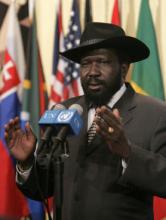
African church leaders are urging parties in the South Sudanese conflict to respect places of worship, after rebels attacked and looted church compounds in the town of Malakal.
The Roman Catholic Cathedral of Malakal was looted at gunpoint, forcing priests, and civilians to flee, a regional church leader said.
Catholic and Presbyterian churches, a hospital and an orphanage have become safe havens for refugees escaping the fighting in the city.
“I came to know myself what it means to be asked for something under the threat of a gun when a group in uniform stopped me on the way from the hospital to the church,” said one Catholic priest, who did not give his name because he fears for his safety. “They blocked me and took my watch and a key.”
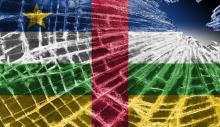
This weekend we’ll commemorate the too-short life and great work of Dr. Martin Luther King Jr. While we rightly celebrate his life dedicated to advancing equality for all, too often we overlook his call to peacemaking. This year, in light of conflicts in Syria, South Sudan, and an often-overlooked war in Central African Republic, we should remember his words.
In his 1967 speech, “Beyond Vietnam — A Time to Break Silence,” King opposed the violence, saying:
"To me the relationship of this ministry [of Jesus Christ] to the making of peace is so obvious that I sometimes marvel at those who ask me why I'm speaking against the war. Could it be that they do not know that the good news was meant for all men — for Communist and capitalist, for their children and ours, for black and for white, for revolutionary and conservative?"
Those aware of our long history at Sojourners know that we have always been committed to peace, to opposing unjust wars and finding nonviolent solutions wherever possible. And in all the work we do, we aim to speak out for the least of these, the poorest and most vulnerable.
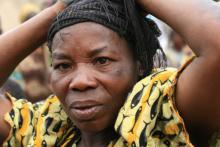
I can still see in my mind’s eye the vibrantly colored wraps draping the hundreds of displaced women I met at Joborona Camp in Northern Sudan. The stories they told, of blazing huts in Southern Sudan and their men burning alive inside; of their boys forced to fight and kill at ages as young as six or seven; and of their girls taken and forced into sexual slavery seemed impossible to be true. Yet I heard them again and again.
And if these stories weren’t horrific enough, it was the stories the women chose not to share that haunt me the most. Their empty eyes and void expressions told me all I needed to know.
I know empty eyes. I have gazed into them in Bosnia and Croatia. I remember Rwanda, Sierra Leone, and Liberia. I have witnessed them in the Democratic Republic of the Congo — where it is believed that one million girls and women have stories to tell of the gender-based violence they have endured. I have been confronted by the eyes of our sisters from Darfur, who risk their dignity, their bodies, and in some cases their very lives by leaving their refugee camps to collect firewood for their small cooking stoves (those who are lucky enough to have one). It is in the bush, often, that they are victims of sexual and gender-based violence. These are the countless women who risk being raped so their children can eat.
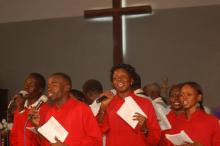
Despite a promise by the Sudanese government to grant its minority Christian population religious freedom, church leaders there said they are beset by increased restrictions and hostility in the wake of the South Sudan’s independence.
In 2011, South Sudan, a mostly Christian region, split from the predominantly Muslim and Arab north, in a process strongly supported by the international community and churches in the West.
The two regions had fought a two-decade long civil war that ended in 2005, following the signing of the Comprehensive Peace Agreement. The pact granted the South Sudanese a referendum after a six-year interim period and independence six months later. In the referendum, the people of South Sudan chose separation.